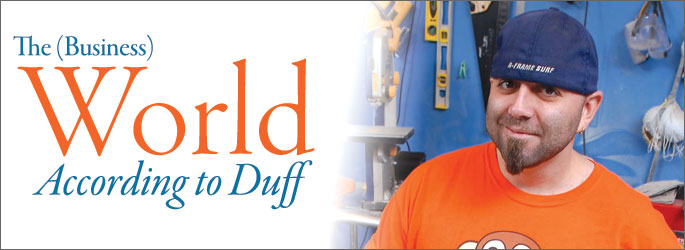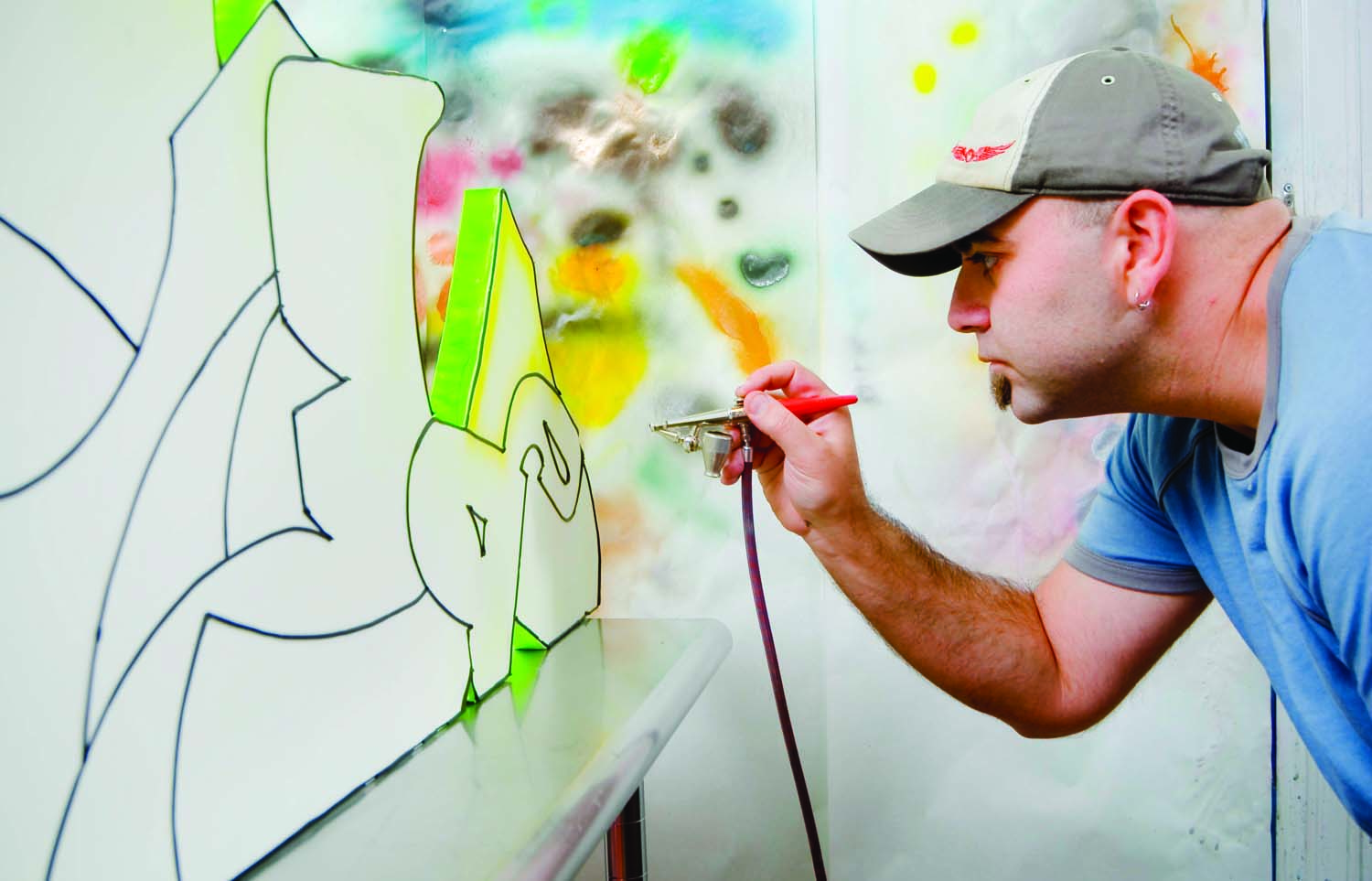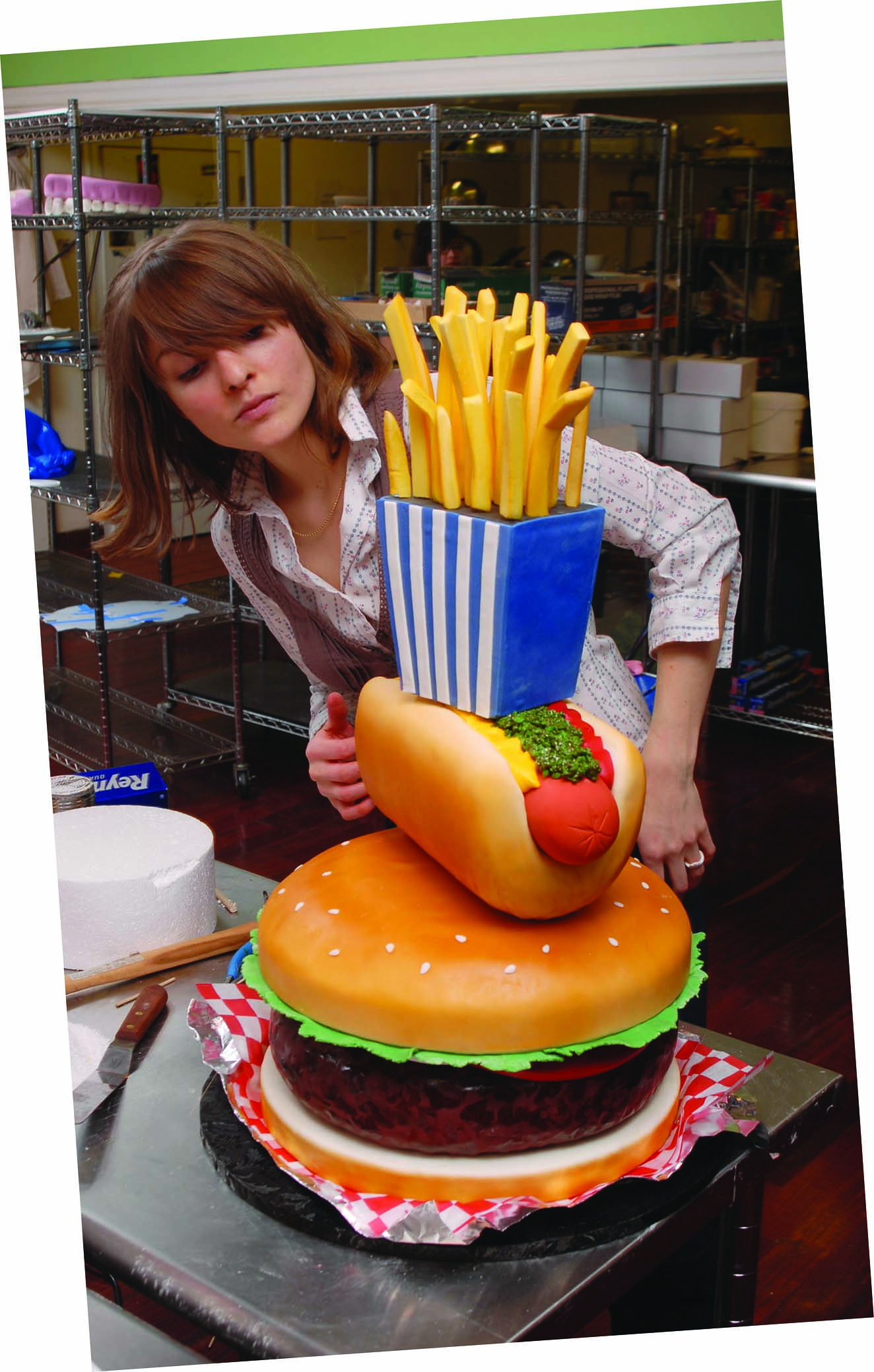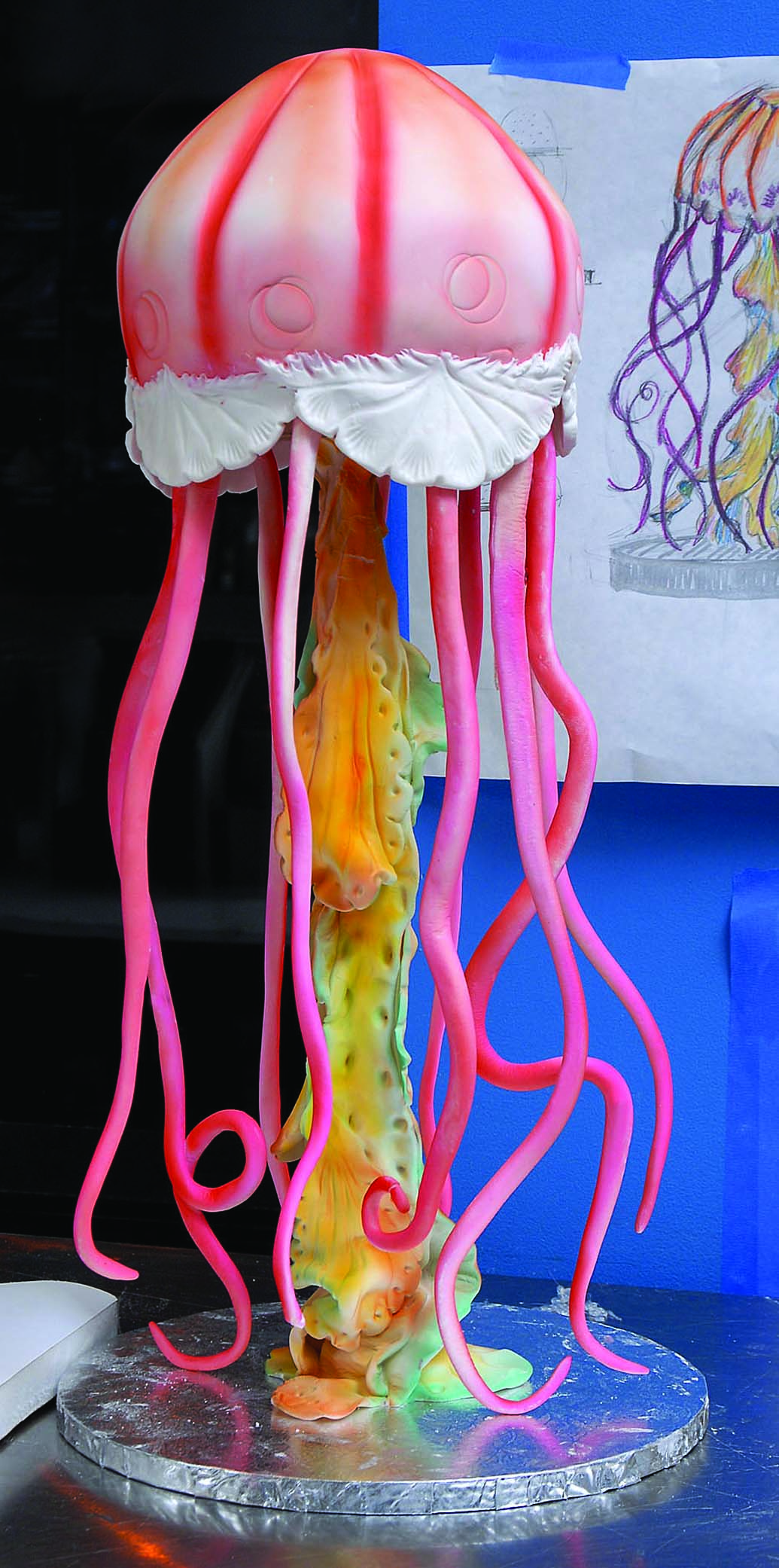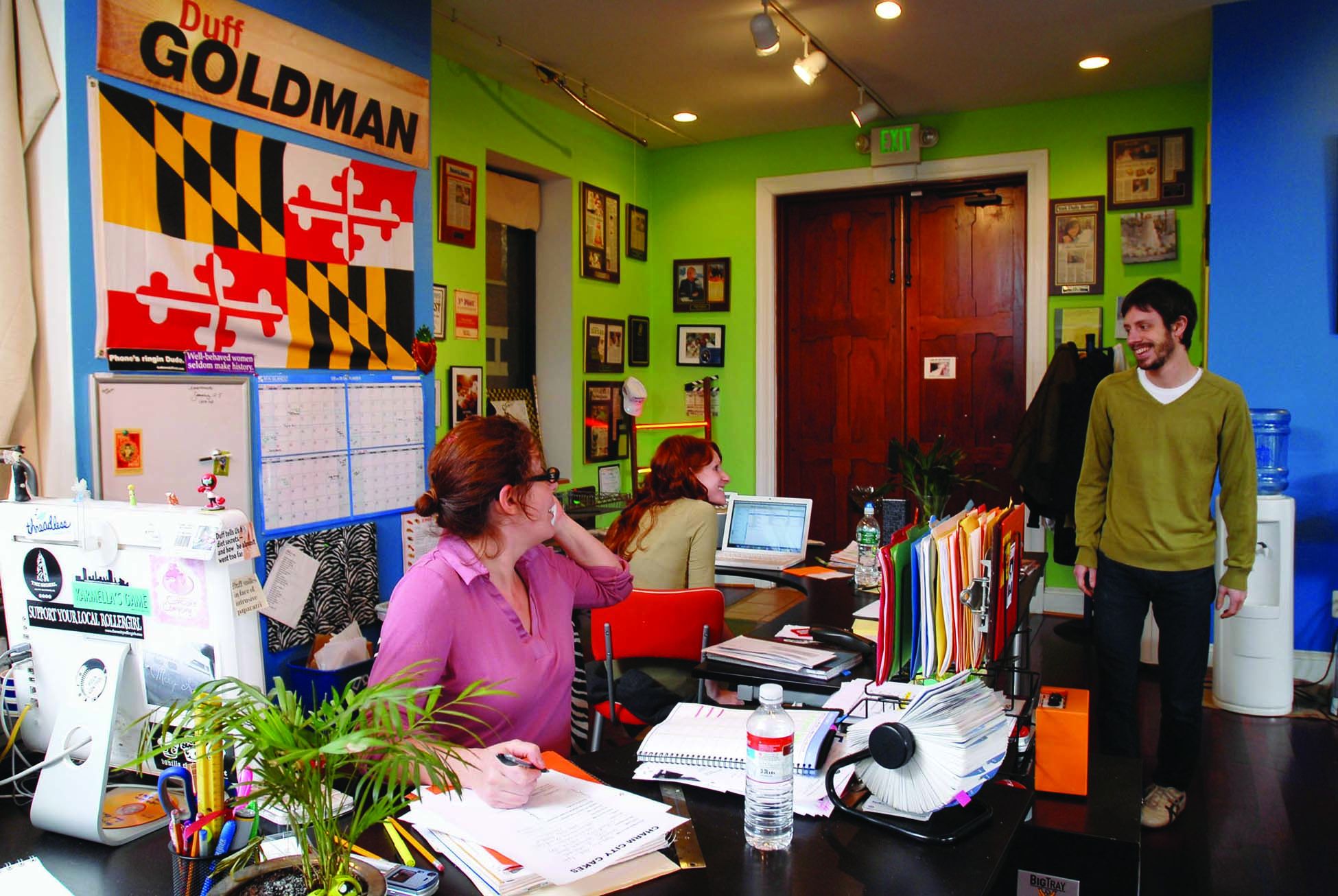Wanna be a celebrity culinary entrepreneur like Ace of Cakes star Duff Goldman ’97? UMBC’s Outstanding Alumnus of the Year in the Humanities for 2009 offers a few hints: Don’t sweat the numbers. Don’t get complacent. And prepare for some hard knocks.
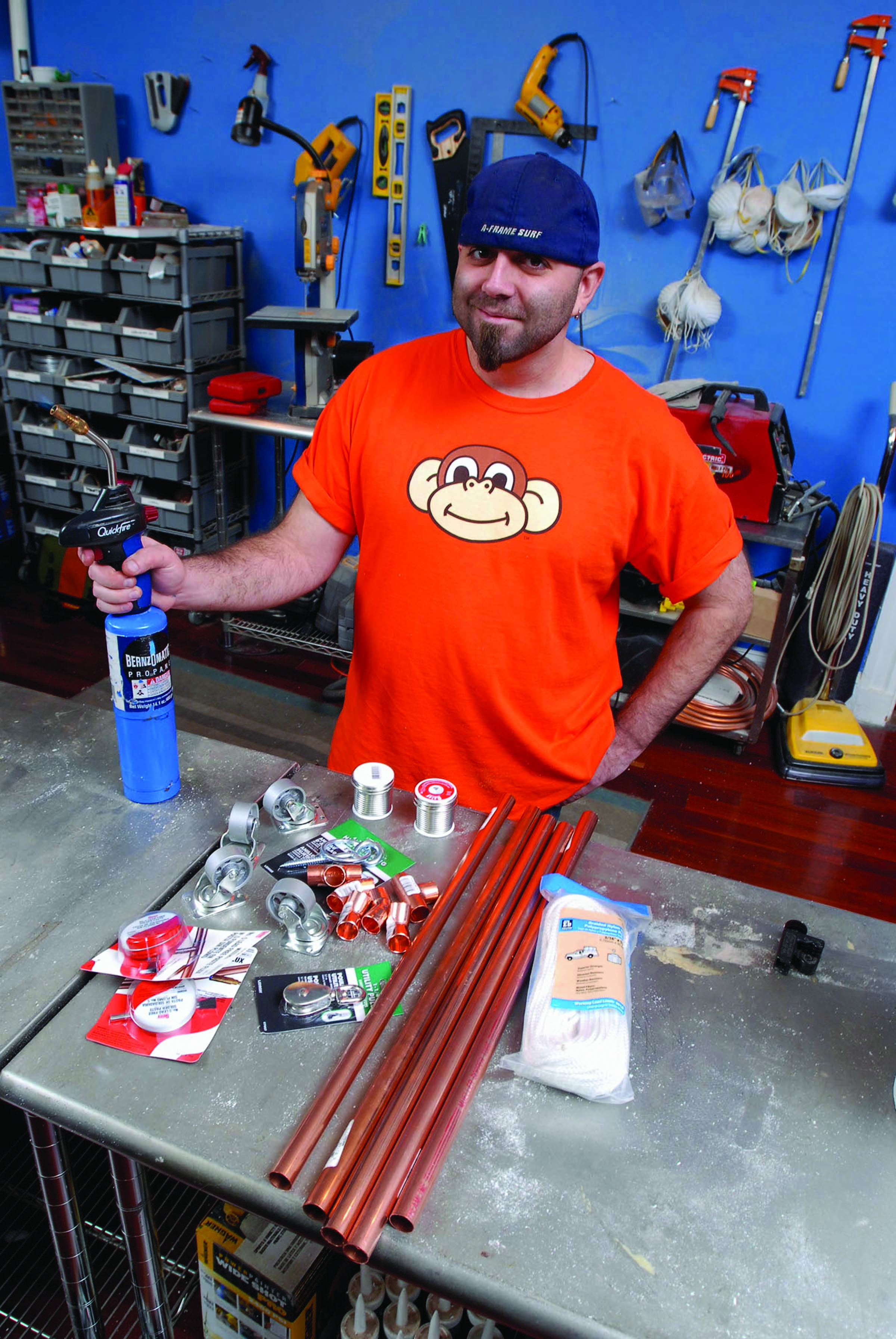 Look at the numbers and Jeffrey “Duff”Goldman ’97, history, is a business whiz of the first order – a thriving entrepreneur whose successful cake making business was launched into the stratosphere by a hit reality show.
Look at the numbers and Jeffrey “Duff”Goldman ’97, history, is a business whiz of the first order – a thriving entrepreneur whose successful cake making business was launched into the stratosphere by a hit reality show.
But as any viewer of Food Network’s Ace of Cakes can tell you, the 34-year-old celebrity cake maker has become a financial success and certified phenomenon in the exploding media niche of televised cooking without compromising his scruffy, scrappy look and ethos – tattoos, goatee, baggy jeans and all.
Catching up with Goldman on tour for his newly released book, Ace of Cakes: Inside Charm City Cakes (William Morrow Cookbooks), it seemed a good moment to ask him to play professor for a day. What would be his advice to a class of business students looking to adapt his life lessons into a crash course of entrepreneurship?
1. Lose the Fear
Goldman’s first lesson is, if nothing else, a great attention-getting device. “I’d take everyone out in the parking lot,” he says after some thought, “and make everybody punch somebody else in the face.”
How’s that, again? “Well, it’d be fun, first of all,” he says. Beyond the shock value of the experiment, though, Goldman points out there’s an enduring – if painful – wisdom to be won from any parking lot beatdown.
The lesson goes back to Goldman’s own coming-of-age woes in junior high. “It used to be the scariest thing, getting punched in the face,” he recalls. But after being on the receiving end of his first major fist-to-face encounter, Goldman gleaned a crucial insight: “All of a sudden, I was over my fear and I was able to fight better.”
It’s a benefit he sees accruing to his class of fledgling M.B.A.’s-cum-pugilists. “There’s something about losing your fear [and] being able to do something without worrying about failing… if you’re worried about failing, the chances are you will,” he says.
Fearlessness has served Goldman well. He started Charm City Cakes in 2000, baking pastry in his Baltimore apartment after a decade and a half in the restaurant business left him feeling like he “didn’t have balance” in his life.
What he really wanted was to be in a band, he reminisces. But he also needed to make a living. He hatched a plan, and rehearsed it to himself: “Alright, here’s what I’m gonna do: make cakes, out of my apartment, guerilla style… and be in a band,” he says. He planned on baking cakes for 10 months out of the year and touring during the other two.
Almost 10 years later, Goldman’s band – “…soihadto…” – has a record deal and toured for two months in 2009 and into 2010. It will be an eight-week working vacation from the multi-million dollar business that Charm City Cakes has become.
And Goldman’s 15 employees? They get two months vacation as well. “Paid,” Goldman says. “We seem to attract the kind of people that need [that time] to take off and do whatever.”
2. Slap Some Color on It
The baking side of Goldman’s baking/band business plan has attracted a lot of business, a lot of attention and a lot of money. Plus, the runaway success of Ace of Cakes – now in its fourth season on Food Network – allows Goldman and colleagues to turn down most of the orders that come through the transom. They’re often too busy baking cakes for, say, a Harry Potter premiere. Or the cast of Lost. Or Michael Jordan.
As Goldman warms to the idea of his own business class, he has another important lesson to impart: “Go paint some stuff.” Preferably public property, he adds. Preferably in the middle of the night. Preferably in letters three feet high. “When you do something, and really throw caution to the wind,” he observes, “it makes taking on a new venture not as scary.”
Goldman was an ardent graffiti artist in his youth. He recalls being chased out of train yards, cops at his heels. And just as the hidden lesson of face-punching is fearlessness, so the lesson he takes from graffiti boils down to a business-worthy slogan: “Never get complacent.”
“That’s the worst thing in the world,” Goldman continues. “In business, in entertainment, in anything in your life, is to get complacent. Never get complacent, never ever ever. That’s when ratings go down.” Avoiding complacency isn’t just about not getting caught. It’s about getting better.
“Things can always get better,” he says. “We’re not the best cake decorators on the planet, but we’re pretty goddamn good, and when we do stuff, we’re always like: ‘How can we make this better? How can we make this more accessible, how can we make this edible?’ We’re constantly perfecting and changing the way we do things.”
3. Get a Good Number Cruncher
Goldman’s quest for perfection doesn’t rule out practical considerations, though. Hence the third lesson in Goldman’s emerging curriculum: “Choose a good accountant.”
It’s an important step for any business, and Goldman admits that he didn’t get it quite right at the beginning. “My first accountant would just yell at me: ‘You have to do the business part! You have to do the business part!’ And I would say, ‘Hey, man, I’m just a cake decorator.’”
Eventually, Goldman found a more understanding numbers guy who has let him take care of the creativity and the cakes. “I found the ones with the nicer offices and the friendlier staff,” he says. “It’s almost like when you go to Chinatown, if you go to a restaurant and there’s no white people in there, chances are the food is really good. Look for an accountant who looks like he’s got his finances in order.”
4. Right = Not Wrong (101)
Goldman circles back quickly to the quality control side of things, with a deceptively straightforward fourth principle of business success: Don’t do it wrong.
He lays out this lesson as a Zen koan. “I had kind of an epiphany,” Goldman says. “At a restaurant, the service was great and the food was really good and there was a cool vibe. I get up and go into the bathroom and the bathroom is beautiful. Really nice bathroom. I was like, ‘Wow.’ I’m kind of always sizing thing up, whether it’s a cake or a business.”
Goldman emerged from his pit stop, he says, with a simple realization: “Succeeding in business is not difficult. The way to do things right is to not do them wrong. I know it’s a really simple, stupid idea but I came out of the bathroom with this idea.”
Goldman interrupts his epiphany in the rapid-fire free-associative manner that fans of Ace of Cakes will readily recognize: “That’s the name of my class! ‘The way to do things right is to not do them wrong.’” 101. Or something of that sort. “There’s no get rich quick; if there was, everyone would be doing it.”
5. Sure, Hire Your Friends
It turns out that one critical key to not getting things wrong is solving a critical issue facing most company managers: Finding the right kind of employee.
Any viewer of Ace of Cakes knows that this is yet another instance where Goldman has stood conventional wisdom on its head. The show’s opening features a catchy little summation of Goldman’s career that ends with the declaration, “So I decided to make cakes my way, and hired the most talented people I know: my friends.”
Sure enough, even a casual viewing of the show gives a glimpse of a workplace full of inside jokes, affection and camaraderie. Thus lesson five in the Goldman plan: Go ahead and hire your friends.
“I think most Harvard M.B.A.s would probably say: ‘Don’t hire your friends, you don’t want to deal with the nonsense.’ And I can understand why. I think you have to have a certain kind of friend and a certain kind of business,” says Goldman. “But our business has grown so organically… I have a lot of friends, and I haven’t hired them all. I’ve only hired the ones that have a knack for making beautiful stuff. For making nice cakes.”
6. Keep it Loose. But Keep it Tight.
This organic process feeds on itself, Goldman insists. His already close-knit team tends to select for people who aren’t intimidated by personal banter in close quarters, and who tend to pick up quickly on inside jokes.
Conversely, Goldman says he’s also developed a heightened sensitivity to people who could introduce disputative or disruptive vibes into his hyper-collegial workplace. So, lesson number six: Make sure the person you hire belongs on the team.
“Like when they were looking at Terrell Owens for the Ravens, I was, like, ‘Oh no, that’s horrible, he’s a team killer,’” says Goldman. “I’ve played a lot of sports and in a lot of what I do, I’m more like a coach than a business owner. Who’s going to work? Who’s going to step up? Who’s going to have the team’s best interest at heart? Especially now that we’re all famous and stuff.”
7. Happiness Rules. For You. For Everyone.
Of course, before hiring one’s friends and building a team, one needs a strong sense of mission. That’s not just found in the casual corporate-branding sense of the term, but via what Goldman calls a “philosophy of cooking.”
Goldman’s final lesson? Do whatever you do not just because it makes you happy, but because it makes other people happy.
Goldman says he’s still a little shocked when he thinks back to his years in culinary school and realizes that “nobody ever asked me why I wanted to cook – and that is a huge part of cooking. If you don’t love [cooking], it’s the worst job in the world.”
A lot of people who become chefs because of what they’ve seen on cable – whether it’s his show, Top Chef, or The Next Food Network Star – are destined to be bitterly disappointed. “One thing that’s very dangerous is that the Food Network and Bravo and all these shows glamorize being a chef,” Goldman says. “If someone wants to become a chef with the goal of getting on TV, it absolutely, 100 percent, will not happen. Period.”
A more appropriate goal, Goldman insists, is “being an awesome chef. That’s the only goal you can have.”
But experience has taught him even that’s not enough. “You have to ask yourself, why do you want to be an awesome chef? You want to be an awesome chef because you want to give people joy. You want to give them that piece of magic that you have brought to them. That you have brought to your kitchen… To be a chef is to want to please people. I had a job where I was making $14,000 a year but I knew people were enjoying my food, and that was all I needed. Well, that and the food I stole out of the locker.
“Now, having worked in the business for as long as I have,” concludes Goldman, “my greatest joy is not just creating, but creating and seeing the look on people’s faces when I give them something…. Seeing that reaction and knowing I’ve made someone smile. And that mortgage payment or that problem at work or that problem in their love life or whatever it is has gone away, just for a second. Because I made ’em a cake. I love that.”
* * * * *
Tags: Winter 2010

